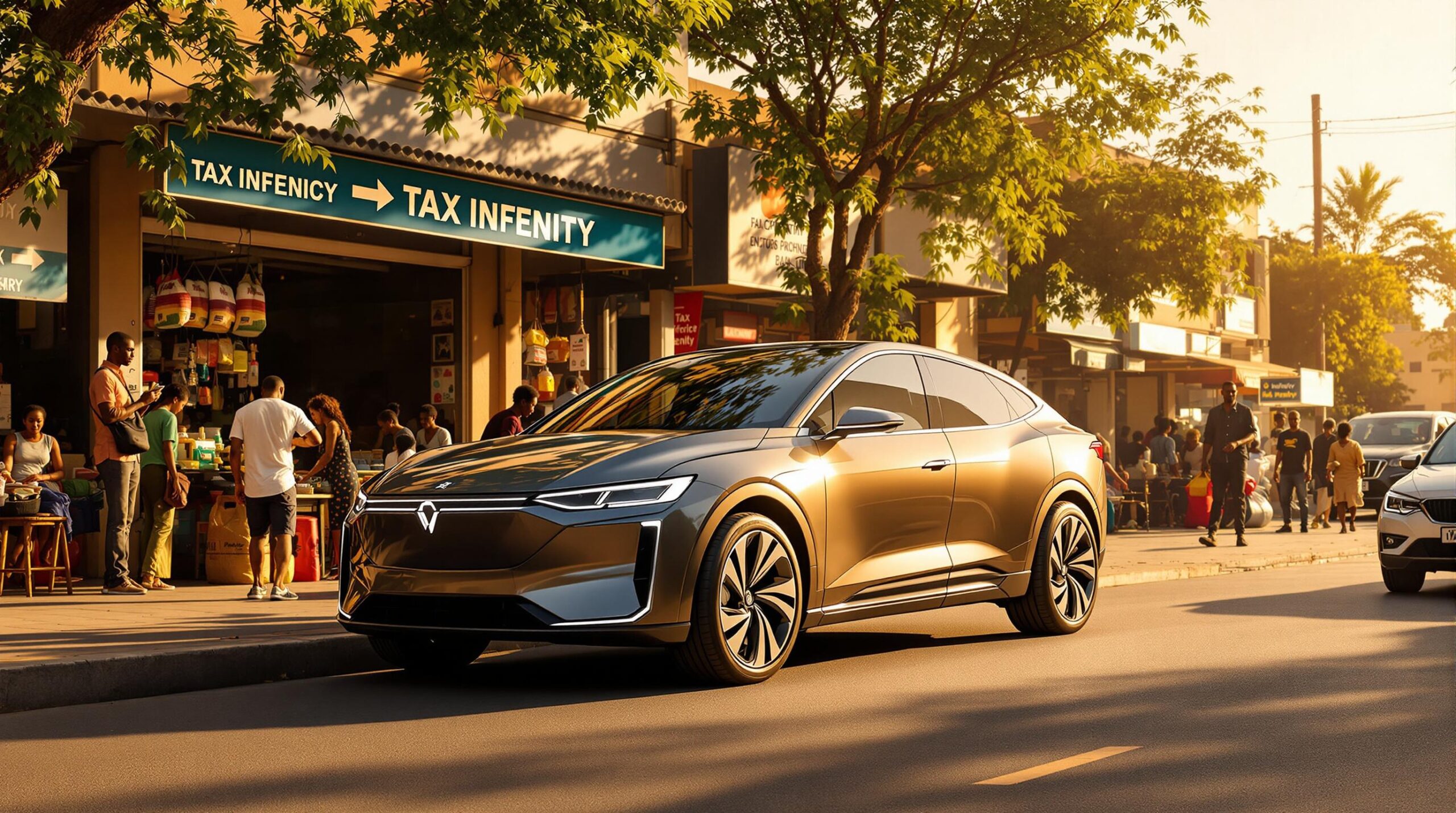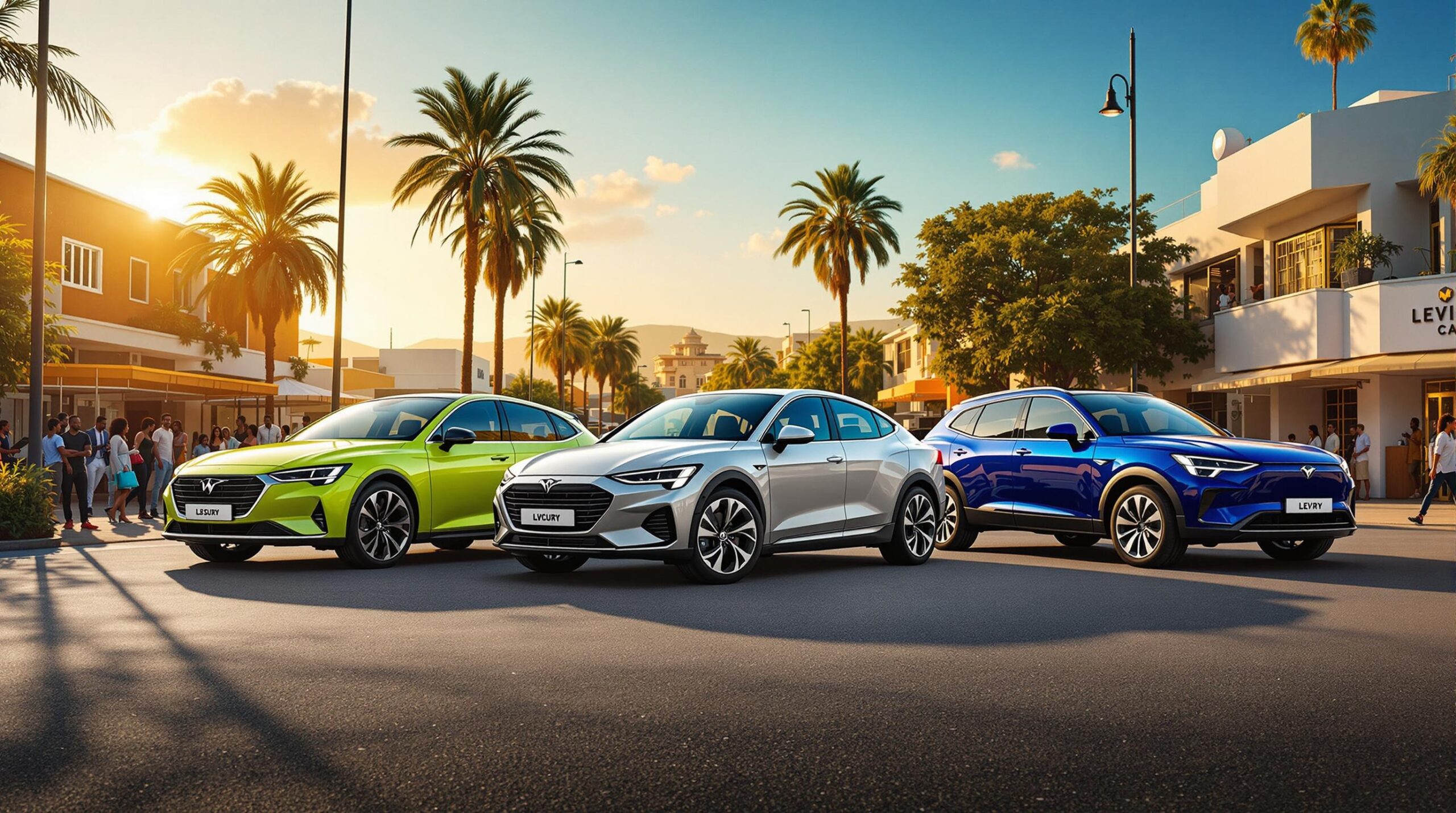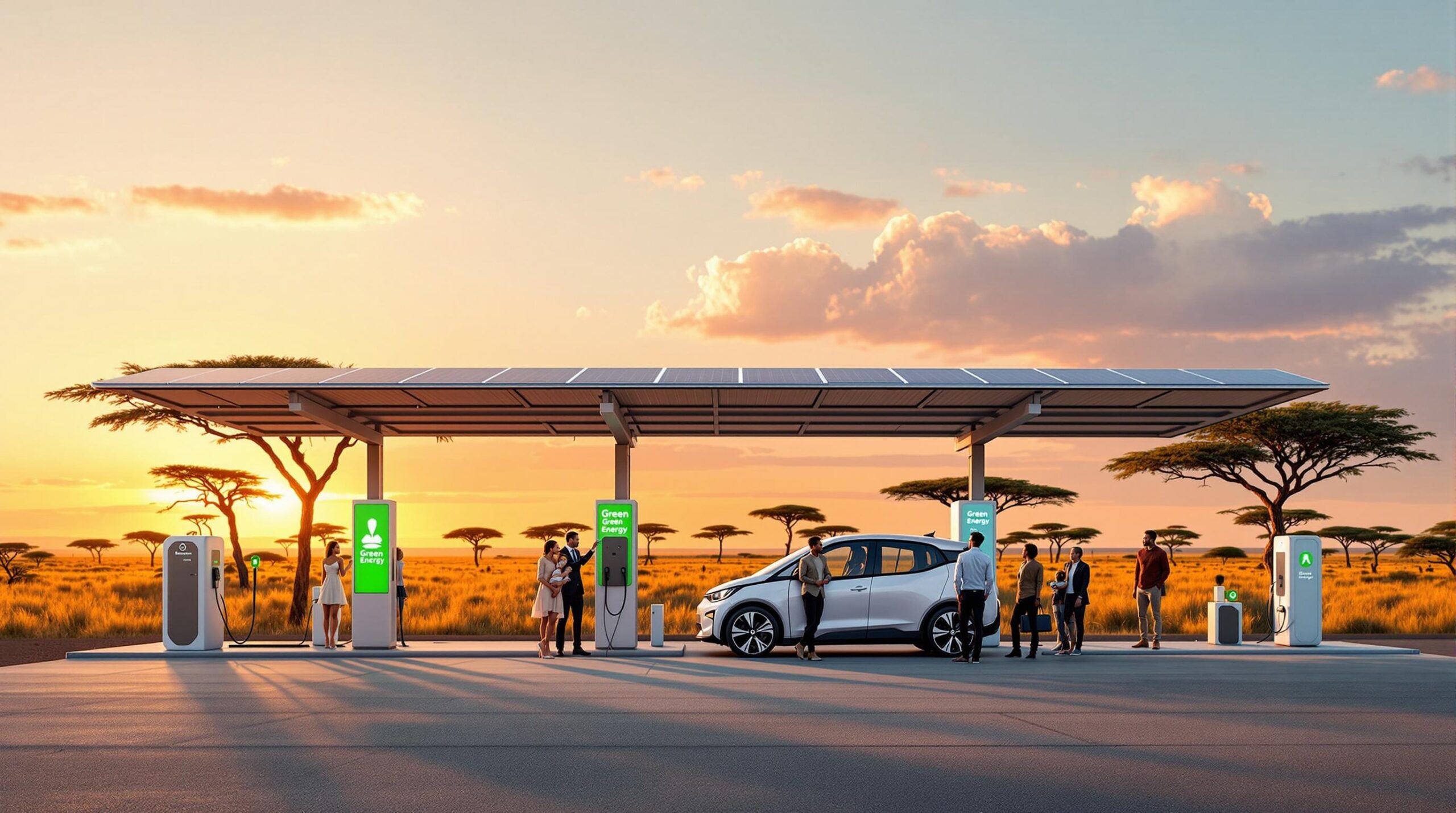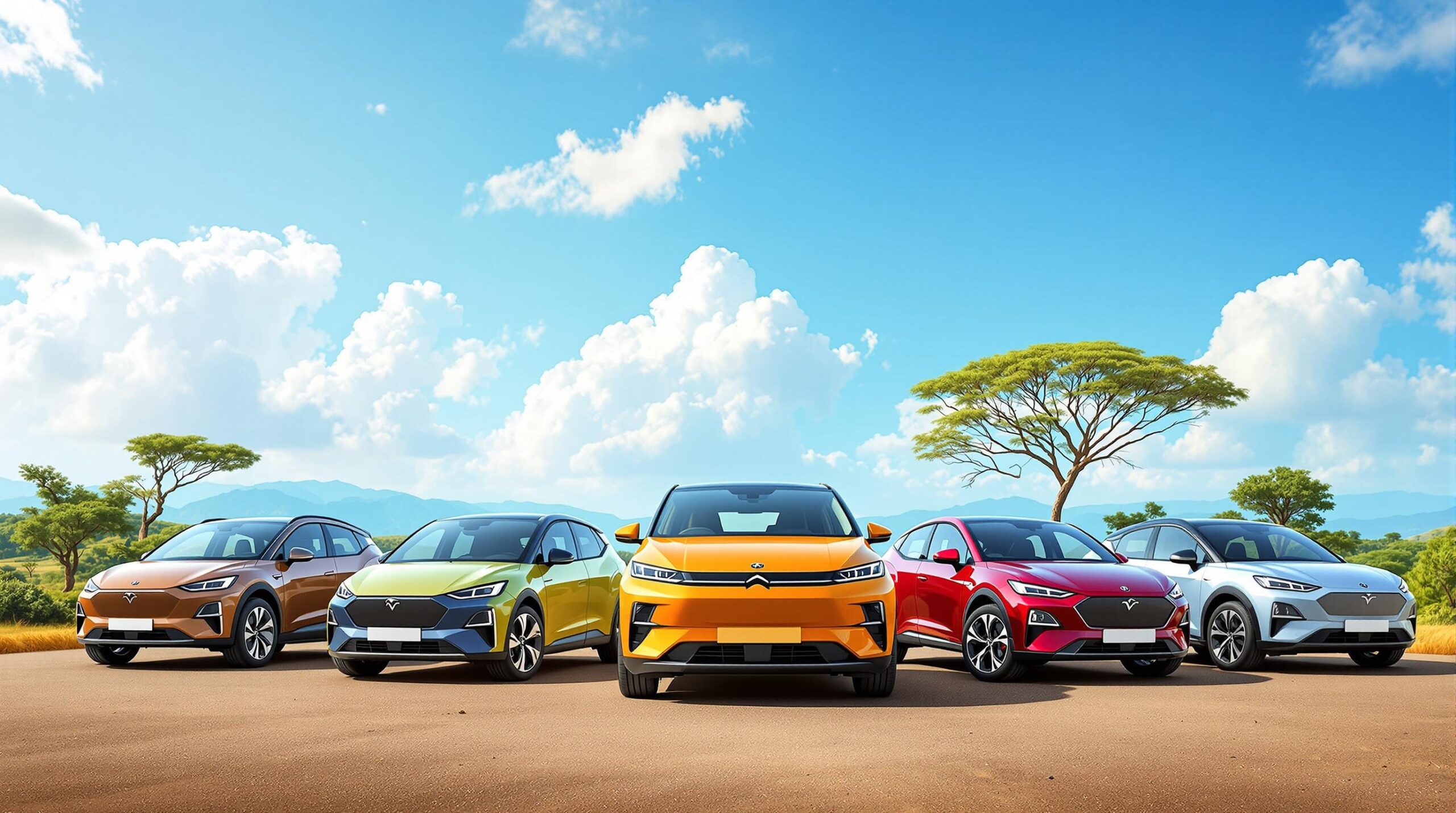
Switching to an EV in Africa can save you money through tax breaks, rebates, and lower running costs. Here’s what you need to know:
- Tax Incentives: South Africa exempts EVs from carbon taxes, reducing ownership costs.
- Rebates: Some countries are planning purchase rebates to make EVs more affordable.
- Charging Infrastructure: Governments and companies are expanding charging networks, though rural areas still face challenges.
- Affordable Options: EV prices start as low as $4,800 (e.g., the LINGBOX UNI), making them accessible to more buyers.
- Lower Running Costs: EVs save on fuel and maintenance, benefiting individuals and businesses alike.
Quick Comparison of EV Models:
| Category | Price Range | Example Models |
|---|---|---|
| Budget-Friendly | $4,500 – $8,500 | LINGBOX UNI, GEELY PANDA MINI |
| Mid-Range | $14,000 – $25,000 | BYD QIN PLUS EV, DONGFENG-HONDA LINGXI L |
| Premium | $30,000 – $45,000 | BYD TANG EV 2024, LEAPMOTOR C01 |
Despite high upfront costs and limited rural infrastructure, government support and affordable financing options are making EVs a practical choice for many.
Tax cuts, incentives as Tunis eyes increased EV adoption
Tax Benefits for EV Owners
In Africa, tax incentives are helping reduce the cost of owning electric vehicles (EVs). South Africa’s carbon tax framework is a prime example, offering a model that could inspire similar initiatives across the region.
Carbon Tax Exemption
South Africa’s system exempts EV owners from the carbon tax typically charged on vehicles’ CO₂ emissions. This exemption lowers operating expenses, making EVs more attractive to individual buyers and businesses. For fleet operators, the savings can be redirected into growth efforts or improvements to infrastructure.
Government Support Programs
Governments across Africa are working to promote the use of electric vehicles (EVs) by offering financial incentives and investing in infrastructure. Here’s a closer look at these efforts.
Purchase Rebates
Some African countries are considering offering rebates to make EVs more affordable. While many of these initiatives are still in the planning stages, they aim to work alongside tax reductions to lower the upfront cost of EVs.
Charging Station Expansion
Both governments and private companies are putting resources into building dependable charging networks to meet the growing demand for EVs.
Country-Specific Initiatives
Here are a few examples of actions being taken:
- Ethiopia: The government has placed restrictions on importing internal combustion engine (ICE) vehicles to encourage a shift toward EVs.
- Tunisia: Reduced taxes on EV-related equipment aim to make vehicles and charging infrastructure more accessible.
sbb-itb-99e19e3
Cost Savings with EVs
Switching to EVs isn’t just about tax breaks and rebates – there are real savings in day-to-day operations and finances.
Lower Running Costs
EVs help cut costs on fuel and maintenance. With fewer moving parts and no need for oil changes, they’re easier and cheaper to maintain. This means lower service bills, which can directly improve business profitability.
Business Income Benefits
For businesses, especially those in delivery and transportation, EV fleets mean lower operating expenses. Here’s a quick comparison of some popular EV models and their benefits:
| Vehicle Type | Initial Cost | Key Benefits |
|---|---|---|
| GEELY PANDA MINI BASE | $5,880 | Great for city deliveries, minimal maintenance |
| DONGFENG FENGON WINDSTAR E380 | $23,300 | Handles larger cargo, offers extended range |
| LINGBOX UNI | $4,800 | Best for last-mile delivery, most budget-friendly |
Payment Plans and Loans
Worried about the upfront cost? Flexible financing options are making EV ownership easier than ever. Platforms like EV24.africa offer payment solutions tailored to different budgets, helping businesses and individuals afford models like the DONGFENG FENGON WINDSTAR E380.
Here’s how their financing works:
- Flexible Payment Terms: Adjusted to match your cash flow.
- Clear Pricing: Transparent breakdown of all costs and fees.
- Market-Specific Plans: Payment options tailored for different regions.
- Bulk Purchase Support: Special financing deals for larger orders.
These financing options lower the entry barrier, making EVs a more practical choice for a wider audience. It’s a step forward in making cleaner transportation accessible.
Current Barriers and Growth Areas
Electric vehicle (EV) adoption in Africa is on the rise, but several challenges still need to be addressed.
High Purchase Prices
While EVs are becoming more affordable, many models remain expensive for the average buyer. For instance, luxury options like the VOYAH DREAMER EV ($97,000) and ZEEKR 009 ($85,000) are far beyond the reach of most consumers.
| Vehicle Category | Model Examples | Price Range |
|---|---|---|
| Budget-Friendly | LINGBOX UNI, GEELY PANDA MINI BASE | $4,800 – $5,880 |
| Mid-Range | LEAPMOTOR T03 | $9,500 – $12,000 |
| Mid-Range | BYD QIN PLUS EV | $14,180 – $17,880 |
| Premium | BYD TANG EV 2024, DONGFENG RCH 6 EV | $34,700 – $44,500 |
This pricing spectrum shows that while there are budget-friendly options, premium models dominate the market, limiting accessibility for many.
Limited Rural Charging Infrastructure
Charging infrastructure remains a major hurdle, especially in rural areas. While cities are gradually building out networks, rural regions face several obstacles:
- Unreliable power grids in remote locations
- Few charging stations outside urban centers
- High costs associated with setting up stations in less populated areas
Addressing these infrastructure challenges is crucial to making EV ownership practical and accessible across the continent.
Conclusion
After reviewing tax cuts, government incentives, and cost-saving opportunities, the financial perks of owning an EV in Africa are clear. While upfront costs remain a factor, many African nations offer tax breaks and subsidies that make investing in an EV a smart choice.
Affordable models like the LINGBOX UNI, starting at $4,800, and mid-range options such as the BYD QIN PLUS EV at $14,180 highlight the variety of vehicles available to suit different budgets.
At EV24.africa, we make importing and buying electric vehicles in Africa straightforward. With our expertise, you’ll enjoy a smooth, transparent, and hassle-free process, so you can focus on embracing the future of mobility.
– EV24.africa
Here’s a quick look at the market options:
| Category | Price Range | Example Models |
|---|---|---|
| Entry Level | $4,500 – $8,500 | DONGFENG YUEXIAN, GEELY PANDA MINI |
| Mid-Range | $14,000 – $25,000 | BYD QIN PLUS EV, DONGFENG-HONDA LINGXI L |
| Premium | $30,000 – $45,000 | BYD TANG EV 2024, LEAPMOTOR C01 |
These choices, combined with supportive policies and flexible financing options, align with EV24.africa’s mission to advance sustainable mobility across the continent. Although rural charging infrastructure remains a challenge, government programs and payment flexibility are making EVs more accessible. With these developments, EV adoption in Africa is set to grow quickly.




